 STATE CONSTITUTION (EXCERPT)
STATE CONSTITUTION (EXCERPT)CONSTITUTION OF MICHIGAN OF 1963
§ 46 Death penalty.
Sec. 46. No law shall be enacted providing for the penalty of death.
STOP COVID-19 DEATH PENALTY IN MICH. PRISONS!
From Detroit Detention Ctr. to Muskegon CF, coronavirus rates rapidly rising, 68 deaths in state; 608 MCF prisoners test positive, half of population
Wayne County Deputy Sheriff’s death, uprisings at Chippewa, Marquette Correctional Facilities: related to COVID-19 stress?
Families and advocates say Gov. Whitmer, Lt. Gov. Gilchrist, and state task forces have not acted to stem the tide: “Michigan has no death penalty”
Class action lawsuits for MDOC, Oakland and Wayne County Jails stalled by government officials, spending tax $$$ on continuing confinement, not care
DE-CARCERATE NOW! Pandemic safety impossible in prisons, jails
By Diane Bukowski
September 14, 2020 Updated September 22, 2020
Donate to Voice of Detroit at https://www.gofundme.com/VOD-readers-up
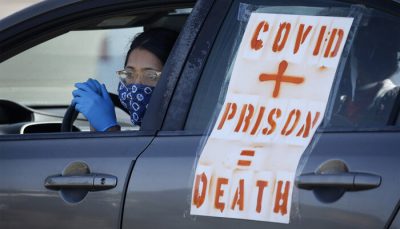
LARKSPUR, CA – MAY 9: A demonstrator waits in her car before a rolling protest caravan departs for the west gate of San Quentin State Prison to demand more protection for prisoners against the coronavirus and COVID-19 in Larkspur, Calif. on Saturday, May 9, 2020. (Paul Chinn/The San Francisco Chronicle via Getty Images)
DETROIT — “We’re really concerned about the quiet within the [prisons] because that is a signal that there’s potential trouble on the rise.”–Troy Rienstra, Nation Outside, Lansing, Michigan April 16, 2020
This month, Wayne Co. Deputy Sheriff Bryant Searcy was killed by a prisoner in the Wayne County Jail Sept. 2, only the second such death in the jail’s history.
Two weeks later, up to 100 prisoners at the Chippewa Correctional Facility in Michigan’s Upper Peninsula seized control of their unit Sept. 13 for several hours after a fight during which a guard tasered one of them, causing him to lose consciousness. State Department of Corrections officials called in U.S. Customs and the Michigan State Police to quell the uprising.

Leopold Allen Jr.: I feel like I’m just waiting to die.
Earlier on the same day as the Chippewa uprising, a guard at the Marquette Branch Prison, also in the Upper Peninsula, was reportedly treated for a head wound and a concussion after trying to break up a spreading fight there.
“I feel as though I’m waiting to die,” Leopold Allen, Jr., a prisoner at Muskegon Correctional Facility who tested positive for COVID-19, said as families of prisoners there rallied outside in August month.
His girlfriend Tangela Dooley of Detroit said that he and 30 other prisoners who tested positive were put in a garage with bunk beds there to isolate them.
As of April 14, however, there were no positive COVID-19 cases at Muskegon, according to an article by Michigan ACLU reporter Curt Guyette.
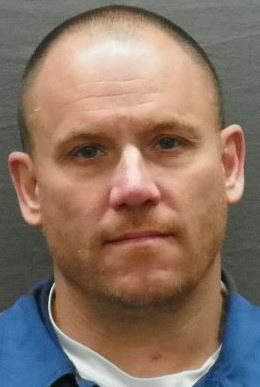
Jamie Meade MDOC
But soap was being rationed: only two small hotel-sized bars were allotted each week to prisoners, which was to be used for everything from showering to washing dishes and to cleaning clothes. If they wanted more, they would have to buy it at the prison commissary if they had funds.
Guyette interviewed several men locked up there at the time, who contradicted the official MDOC statement that soap was provided for free anytime it was asked for. Additionally, Guyette reported, bleach was only being used sporadically for cleaning, although MDOC spokesman Chris Gautz told him that the prison was going to use it regularly.
Jamie Meade, serving a life sentence at Muskegon, made a heart-rending and prophetic plea for help:
See: “Unprotected in Prison: Pleas for Help from the Inside” at https://www.aclumich.org/en/news/unprotected-prison-pleas-help-inside.
Elsewhere in Michigan, prisoners who test positive or are suspected of being sick are being placed in solitary confinement under punitive conditions, Bridge Magazine reported Aug. 24.
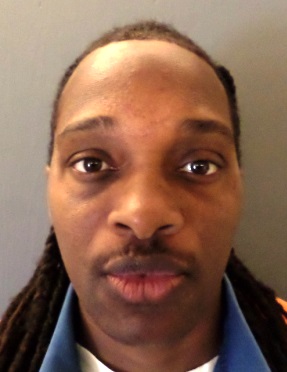
Edmund Fields MDOC photo
An investigation by Bridge partner Outlier Media said such individuals are also placed in ‘cohorts’ that allow the virus to spread to the healthy, confirming reports by many MDOC prisoners that mass facility-to-facility transfers of sick individuals are taking place.
“Inmates such as Edmund Fields said they were stripped of their property, denied communication with loved ones and moved into rooms with just a toilet and bunk for 24 hours per day,” Bridge reported.
“Fields spent 14 days starting on April 29 in isolation after his roommate at the Thumb Correctional Facility in Lapeer tested positive for COVID-19. He was allowed 30 minutes outside his cell every other day.”
Bridge quoted Fields, “Why are we being treated as if we’re deserving of punishment for contracting or being in close contact to this disease? Even guys in [solitary] are typically afforded an opportunity to go outside and get some air.”
See: “Care or Punishment: Michigan Prisoners placed in solitary as COVID 19 surges” at https://www.bridgemi.com/michigan-government/care-or-punishment-michigan-prisoners-placed-solitary-covid-surges
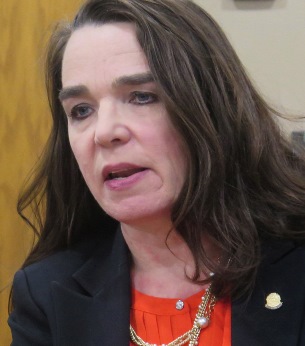
Heidi Washington, MDOC Director
On Aug. 28, the union representing guards at the MDOC called for the removal of MDOC Director Heidi Washington over the administration’s handling of the coronavirus crisis in the prison. The Michigan Corrections Organization said, “Unfortunately, we are at a point where the current work conditions are unacceptable for our members.”
Washington has been director since 2015, one of only a few officials Gov. Gretchen Whitmer kept from former Gov. Rick Snyder’s administration.
On Aug. 13, members of the Detroit People’s Task Force protested outside the Detroit Detention Facility regarding the COVID pandemic in the prisons.
DPTF chair Marilyn Jordan, whose son is serving a life term in the MDOC, said her organization and others have not heard from either Gov. Whitmer or Lt. Gov. Garlin Gilchrist II regarding concerns for their loved ones inside the walls. She said she has been unable even to call Gilchrist at his own phone number, instead calls to him are routed through Whitmer’s office. (See video below.)
Whitmer appointed Gilchrist as chair of her Task Force on Racial Disparities in the Coronavirus Pandemic, and as co-chair of the Michigan Joint Task Force on Jail and Pretrial Incarceration.
Jordan called on Whitmer and Gilchrist to “Fix the COVID-19 in the Prisons,” recalling her campaign slogan “Fix the Damn Roads.”
Whitmer earlier issued updated Executive Order #20-100 with regard to prisons and jails in Michigan. See http://voiceofdetroit.net/wp-content/uploads/Whitmer-Executive-Order-2020-119-COVID-19-June-11-2020.pdf.

Gov. Gretchen Whitmer.
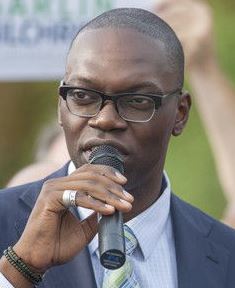
Lt. Gov. Garlin Gilchrist II
Whitmer’s most recent order addresses important issues including the provision of personal protective equipment and adequate bathing and laundry rules, but does not address de-carceration.
Whitmer rescinded her first order, which said,
“Anyone authorized to act under section 2 of this order is strongly encouraged to consider early release for all of the following, so long as they do not pose a public safety risk: older people, people who have chronic conditions or are otherwise medically frail, people who are pregnant, and people nearing their release date; anyone who is incarcerated for a traffic violation; anyone who is incarcerated for failure to appear or failure to pay; anyone with behavioral health problems who can safely be diverted for treatment.”
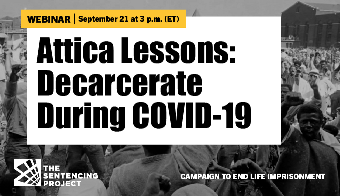 De-carceration is a key demand raised by prisoner advocacy groups nationally, who say that it is not possible to fight the COVID-19 pandemic in overcrowded prisons and jails because measures like social distancing are impossible.
De-carceration is a key demand raised by prisoner advocacy groups nationally, who say that it is not possible to fight the COVID-19 pandemic in overcrowded prisons and jails because measures like social distancing are impossible.
A webinar being held in Michigan Sept. 21 (see photo at right) will feature: Jose Hamza Saldaña, Director of Release Aging People in Prison, survived 38 years of imprisonment; Heather Ann Thompson, Pulitzer Prize-winning author of Blood in the Water: The Attica Prison Uprising of 1971 and Its Legacy; Sharif A. Hamid, survivor of the ’71 Attica Uprising and Massacre; and Roslyn Smith, survived 39 years of imprisonment.
For information go to: https://sentencingproject.salsalabs.org/attica_uprising_49_sept21_event
Also see Sentencing Project’s YouTube video of the event, posted Sept. 22 (below this story.)
During a car caravan in Lansing April 15, the Michigan advocacy group Nation Outside raised a list of de-carceration demands, including:
- Suspension of Michigan’s Truth in Sentencing Law, which could allow the release of 3,000 to 5,000 prisoners with good behavior. The law requires prisoners to serve their entire minimum sentence before parole consideration.
- Grant emergency special commutations.
- Waive the two-year requirement between filings for commutation.
- Expedite the parole process.
- Convene a task force to evaluate other emergency measures.
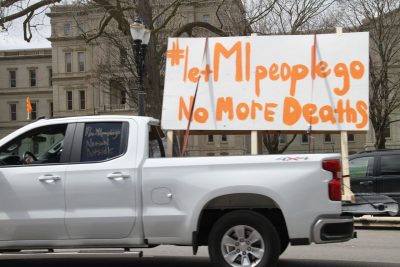
Protesters in Lansing April 16, 2020 call on Whitmer to release prisoners due to COVID-19.
Nation Outside organizer Troy Rienstra, who served 22 years in the MDOC, told MLive reporter Malachi Barrett at the time, “We’re really concerned about the quiet within the population because that is a signal that there’s potential trouble on the rise.”
But after the caravan, Whitmer said “there was nothing she could do” to release more prisoners, other than instituting paroles in a “timely manner.”
The parole process in Michigan has been notorious ever since former Gov. John Engler eliminated Civil Service employees on the parole board, and replaced them with appointees. The first Engler-appointed parole board director, former Berrien County Sheriff Stephen Marschke, said, “Life means life,” referring to 2nd-degree, or “parolable lifers,” who were eligible for parole after 10 to 15 years.
The U.S. is the only country in the world that practices “death by incarceration,” sending people to prison until they die. Most others allow parole consideration after 10-15 years.

William Garrison in a 2009 photo from family visit.
The parole process for eligible prisoners from Wayne County has been further restricted because Wayne Co. Prosecutor Kym Worthy will not waive a 28-day waiting period imposed after parole has been granted. She claims her office must contact the victims of the crimes for which prisoners set for parole are serving time, although that is already done at the state level during parole board hearings.
On April 18, William Garrison, a juvenile lifer who was expecting his release within weeks, died from the coronavirus at Macomb Correctional Facility, one of the state’s four prisons with the highest COVID-19 rate of infections. Garrison had spent 44 years in prison since the age of 17 and had a good record. He was scheduled to be paroled as a juvenile lifer earlier, but chose to wait until he had served enough time to max out and be released.
The order to parole him as a result of that choice came in March, but he was still waiting for Worthy’s office to approve it because of the 28-day waiver.
The State of Michigan was the first English-speaking governmental entity in the world to abolish the death penalty, in 1847, as confirmed in the Michigan Constitution of 1963. But thousands of prisoners in Michigan Department of Corrections (MDOC) and county jails fear they may die from COVID-19 behind the walls.
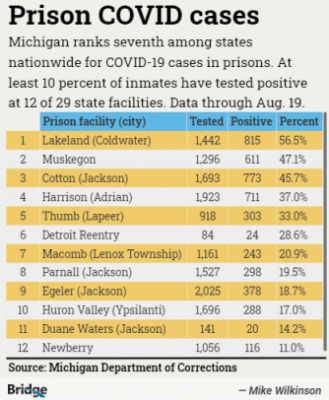 So far, the MDOC reports that 68 confined there have died from the coronavirus. That is the fifth highest number among state prison systems in the U.S.
So far, the MDOC reports that 68 confined there have died from the coronavirus. That is the fifth highest number among state prison systems in the U.S.
Michigan has the seventh highest number of cases nationally, with 5,308 positive cases, according to a database maintained by the Marshall Project. That is 1,543 for every 10,000 prisoners in a total population of 41,000, higher than the rate in in California, whose DOC has a population of 117,000. There, the rate is 1109 per 10,000.
California Department of Corrections and Rehabilitation (CDCR) officials told a federal judge in late July that they planned to release a total of 17,600 prisoners because of the COVID-19 threat, up from an earlier estimate of 10,400.
Many objected, including Corrections Secretary Ralph Diaz, who said he would bock the release of about 5,500, some of them serving life prison sentences.
During the Aug. 13 protest by the DPTF at the Detroit Detention Center on Mound Round (formerly MDOC Mound Correctional Facility), DPTF member Darryl Bracey, who had spent time there after his arrest, but was not later charged, described horrendous conditions including sleeping on the floor with dozens of others who had not been screened for COVID-19, and lack of sanitation (see video above).
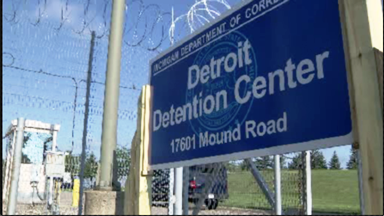 All individuals arrested in Wayne County are sent to the Detention Center before being charged and arraigned. Bracey reported that individuals are being held there longer than the 48-hour limit set by the U.S. Supreme Court in County of Riverside v. McLaughlin, 500 U.S. 44 (1991).
All individuals arrested in Wayne County are sent to the Detention Center before being charged and arraigned. Bracey reported that individuals are being held there longer than the 48-hour limit set by the U.S. Supreme Court in County of Riverside v. McLaughlin, 500 U.S. 44 (1991).
To date, many people, even attorneys, are not aware of this ruling, thinking the limit in Michigan is 72 hours. See: https://www.lexisnexis.com/community/casebrief/p/casebrief-cty-of-riverside-v-mclaughlin.
Class action lawsuits on behalf of prisoners in jails including those in Wayne and Oakland Counties, and the MDOC, who are endangered by COVID-19 were filed earlier this year, but are currently stalled in the appeals process while prisoners continue to die. The appellate process is costing taxpayers money that could be used to remedy conditions in such facilities as well as communities.
Oakland County Sheriff Mark Hackel even appealed a model order issued by U.S. District Court Linda Parker all the way to the U.S. Sixth Circuit Court of Appeals. See http://voiceofdetroit.net/wp-content/uploads/Judge-Linda-Parker-TRO-re-Oakland-Co-Jail-prisoners-1.pdf.

The Old Wayne County Jail (Div. 2).
On April 11, 2020, several men in the old Wayne County Jail sent out an appeal that went viral regarding conditions there. Wayne County Sheriff Benny Napoleon said afterwards that he is addressing the conditions prisoners reported.
One Sheriff’s representative said however that the video was being researched to see who sent it, and that it appeared prisoners were using an illegal “burner” cell phone for the video. However, the mother of the son who sent it said that it was recorded on a jail station set up to allow video visits since in-person visits have been banned during the COVID-19 epidemic.
Relatives of some of those shown in the video reported that they had been placed in solitary confinement or sent to other facilities. One said her son is still in the Wayne County Jail awaiting trial far past speedy trial requirements due to COVID-19 restrictions on court hearings. She said he reports that anyone who tests positive for COVID-19 is being sent to the Dickerson Jail.
Class Action Lawsuits filed on behalf of prisoners at Wayne and Oakland County Jails, and in MDOC facilities, with current status:
WAYNE COUNTY JAIL Last Action: June 5, 2020 ORDER Setting Briefing Schedule on Plaintiff’s Motion to Stay ( Response due by 6/25/2020 , Reply due by 7/3/2020 ). Signed by District Judge Mark A. Goldsmith.
http://voiceofdetroit.net/wp-content/uploads/Wayne-County-Complaint-Final-2.pdf
OAKLAND COUNTY JAIL Last Order by Judge: June 4, 2020 OPINION and ORDER Denying Defendants’ 97 Emergency Motion for Stay Pending Appeal. Signed by District Judge Linda V. Parker.
MDOC CLASS ACTION: Last Action: Jun 03 2020 ORDER Granting In Part Emergency Motion for Expedited Discovery and Expedited Evidentiary Hearing (Dkt. 41), and Denying Emergency Motion to Withdraw Stipulation and Order Requiring Response to Motion for Class Certification (Evidentiary Hearing set for 6/17/2020 08:30 AM before District Judge Mark A. Goldsmith–Not been held to date.)
http://voiceofdetroit.net/wp-content/uploads/MDOC-COVID19-Lawsuit-Daniel-Manville2.pdf
RELATED STORIES:
- MASS MURDER IN MICH.: GOV. SAYS ‘NOTHING SHE CAN DO’ TO RELEASE MORE PRISONERS AS COVID ENGULFS MDOC
-
RELEASE AGING PEOPLE IN PRISON BEFORE THEY DIE; END LIFE WITHOUT PAROLE
-
PROTESTERS URGE WHITMER TO RELEASE MICHIGAN INMATES FACING RISK OF CORONAVIRUS IN STATE PRISONS
- WAYNE CO. JAIL RESIDENTS SAY MANY SICK, DYING WITH COVID-19; MDOC PRISONERS SAY LARGE NUMBERS TOO
- LIFER EFREN PAREDES, JR. REPORTS ON COVID-19 IN MDOC; PRISONERS IN GRAVE DANGER WORLD-WIDE
************************************************************************************
 Donations for the Voice of Detroit are urgently needed to keep this paper, which is published pro bono, going. Among ongoing expenses are quarterly HostLab web charges of $360, costs for court documents, internet fees, office supplies, gas, etc. Please, if you can:
Donations for the Voice of Detroit are urgently needed to keep this paper, which is published pro bono, going. Among ongoing expenses are quarterly HostLab web charges of $360, costs for court documents, internet fees, office supplies, gas, etc. Please, if you can:
DONATE TO VOD at
https://www.gofundme.com/VOD-readers-up
***********************************************************************************




